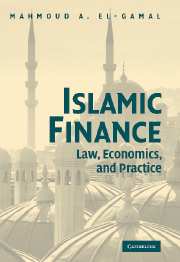Book contents
- Frontmatter
- Contents
- List of Illustrations
- Preface
- Glossary and Transliteration
- 1 Introduction
- 2 Jurisprudence and Arbitrage
- 3 Two Major Prohibitions: Riba and Gharar
- 4 Sale-Based Islamic Finance
- 5 Derivative-Like Sales: Salam, Istisna', and 'Urbun
- 6 Leasing, Securitization, and Sukuk
- 7 Partnerships and Equity Investment
- 8 Islamic Financial Institutions
- 9 Governance and Regulatory Solutions in Mutuality
- 10 Beyond Shari'a Arbitrage
- Conclusion
- Notes
- Bibliography
- Index
9 - Governance and Regulatory Solutions in Mutuality
Published online by Cambridge University Press: 06 July 2010
- Frontmatter
- Contents
- List of Illustrations
- Preface
- Glossary and Transliteration
- 1 Introduction
- 2 Jurisprudence and Arbitrage
- 3 Two Major Prohibitions: Riba and Gharar
- 4 Sale-Based Islamic Finance
- 5 Derivative-Like Sales: Salam, Istisna', and 'Urbun
- 6 Leasing, Securitization, and Sukuk
- 7 Partnerships and Equity Investment
- 8 Islamic Financial Institutions
- 9 Governance and Regulatory Solutions in Mutuality
- 10 Beyond Shari'a Arbitrage
- Conclusion
- Notes
- Bibliography
- Index
Summary
We need to discuss issues of governance, regulation, and enforcement in Islamic finance only to the extent that Islamic financial markets and institutions differ from their conventional counterparts. Wherever substantive differences do in fact exist, reduction of Islamic financial practices to conventional analogs can provide the easiest approach to regulation and governance. In this regard, we have illustrated through numerous examples in previous chapters that Islamic financial market products are substantively identical to their conventional counterparts. Thus, Islamic financial markets and market-supporting institutions require minimal effort to view all products and operations therein in light of their conventional counterparts, and thus conventional governance, regulation, and enforcement best practices may be applied directly.
For instance, many asset-based transactions can be easily converted into conventional loans for regulatory and enforcement purposes, and regulatory capital, reserve ratio, and risk management requirements may be easily applied to Islamic transactions and the institutions that implement them. The only requirement in this regard is to keep track of things like multiple trades and leases in order to report Islamic loan alternatives in the same format used by conventional banks in their reporting to central banks and other regulators.
Regulation and governance of Islamic mutual funds, investment banks, venture capital firms, and the like are even more direct, since their operations are virtually identical with conventional counterparts. The two sets of Islamic financial institutions for which corporate governance and corresponding regulation and enforcement standards need to be developed are in the areas of banking and insurance.
- Type
- Chapter
- Information
- Islamic FinanceLaw, Economics, and Practice, pp. 162 - 174Publisher: Cambridge University PressPrint publication year: 2006



